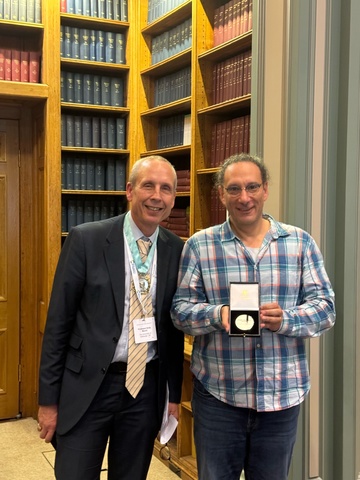By Abby Wedemeyer
Claudio Margulis, professor in the Department of Chemistry in the College of Liberal Arts and Sciences, delivered the prestigious Spiers Memorial Lecture in June in London, England, as part of the Royal Society of Chemistry’s Faraday Discussions.

First presented in 1929, the Spiers Memorial Award honors an individual who has made an exceptional contribution to the field of a Faraday Discussion– a scientific journal that publishes original research papers presented at an ongoing series of conferences on physical chemistry, chemical physics, and biophysical chemistry.
In 2020, the award was converted into the Spiers Memorial Lecture and presented as an introductory lecture at each Faraday Discussion to set the scene for discourse.
Margulis, who has been researching ionic fluids for over two decades, was awarded the honor and presented his lecture, “From Hot to Cold: The Structure and Structural Dynamics of Dense Ionic Fluids,” illustrating recent perspectives on organizational structures and practical applications of ionic fluids.
“I was very honored and excited,” Margulis said about delivering his lecture, adding that being recognized by his peers and other scholars was a “wonderful” accomplishment.
Margulis has been a professor at the University of Iowa since 2003, the same year he established the graduate research team The Margulis Group.
The Margulis Group’s research areas are similar to those discussed in Margulis’ Spiers Memorial Lecture. Graduate students work on theories and simulations relating to room-temperature ionic fluids and high-temperature inorganic molten salts. They “analyze the structures of the liquids in the bulk phase and at interfaces, as well as how the structures behave under harsh conditions,” Margulis explained.
Margulis referred to leading the research group as “the nicest part of the job,” as a faculty member.
“After you work with students for five years, they’re kind of part of your family. Seeing them succeed and go on to productive careers for society is wonderful,” Margulis said. “Some of them have industrial jobs, some are professors, some work at national labs.”
Read publications by The Margulis Group’s members, including Margulis’ Spiers Memorial Lecture, online.